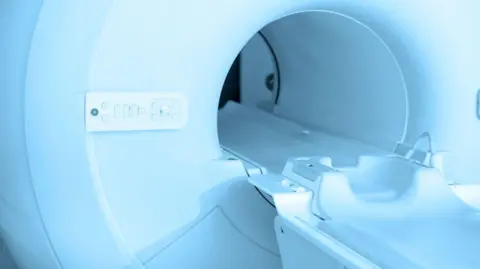Digital post-mortem examinations proposed in Surrey
 Getty Images
Getty ImagesSurrey's coroner's service wants to start carrying out digital post-mortem examinations to tackle rising costs, delays and a shortage of pathologists.
A cabinet meeting being held on Tuesday will decide whether the coroner can introduce digital post-mortem examinations in the county, using a CT scanner.
According to meeting documents, the service is "facing significant risks and issues" meaning the current situation is "no longer sustainable".
The report said approximately 2,400 post-mortem examinations were carried out each year, but introducing a digital option could reduce that to around 600 cases per year.
A cabinet report said that based on other areas with digital capability, 70-75% of all post-mortem examinations could be done digitally.
Of its yearly budget of £4.6m, the coroner’s service spends about £1.5m per year on post-mortem examinations and mortuary services, the report said.
"If the ‘as is’ continues and no investment is made, operational costs for these services will rise at an estimated minimum of £100,000 year-on-year," it added.
Other issues included a national shortage in pathologists trained in invasive post-mortem examinations, a "crisis of capacity" in winter months in hospital mortuaries and "delays and distress caused to bereaved families".
Changes would mean the dead could be released more quickly to a family-appointed funeral director providing a "better experience for the bereaved" and maintaining the dignity of the deceased, the report said.
The council would also need to consider the findings of the Fuller Inquiry in order to take all appropriate steps to safeguard the security and dignity of the deceased, the report said.
The inquiry previously called for urgent reform of the funeral sector following the case in which David Fuller abused corpses, including children, in two Kent morgues over 12 years while working as a hospital electrician.
Surrey's five prisons, five hospitals, two large military barracks, long sections of motorway and railway, proximity to Heathrow and Gatwick and stretches of the River Thames made it a "busy and complex" coronial area, the report added.
Follow BBC Surrey on Facebook, and on X. Send your story ideas to [email protected] or WhatsApp us on 08081 002250.
